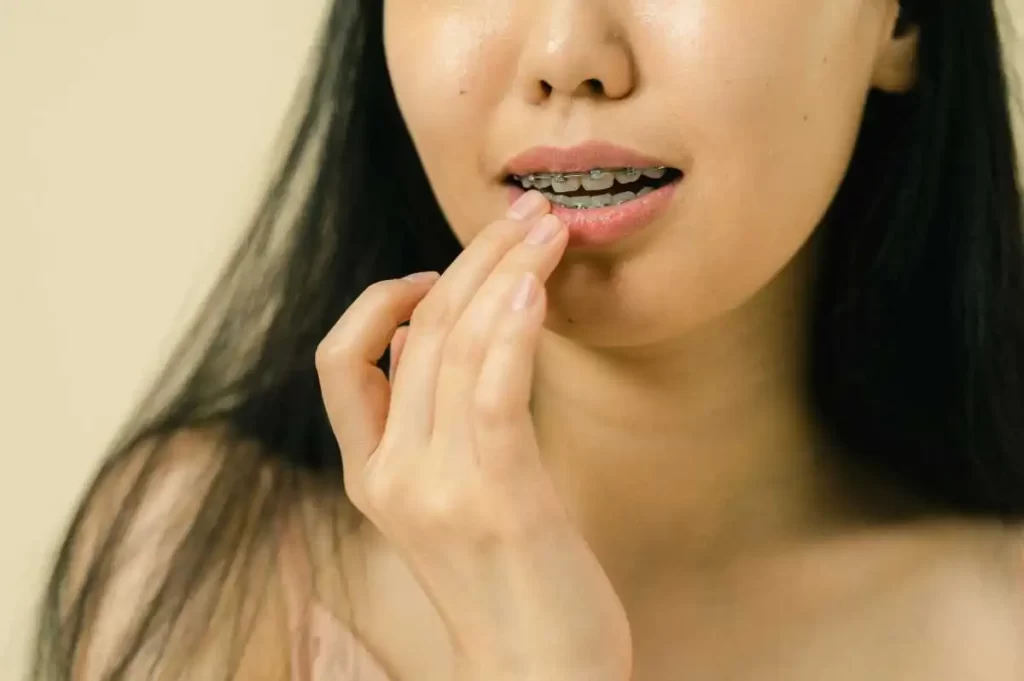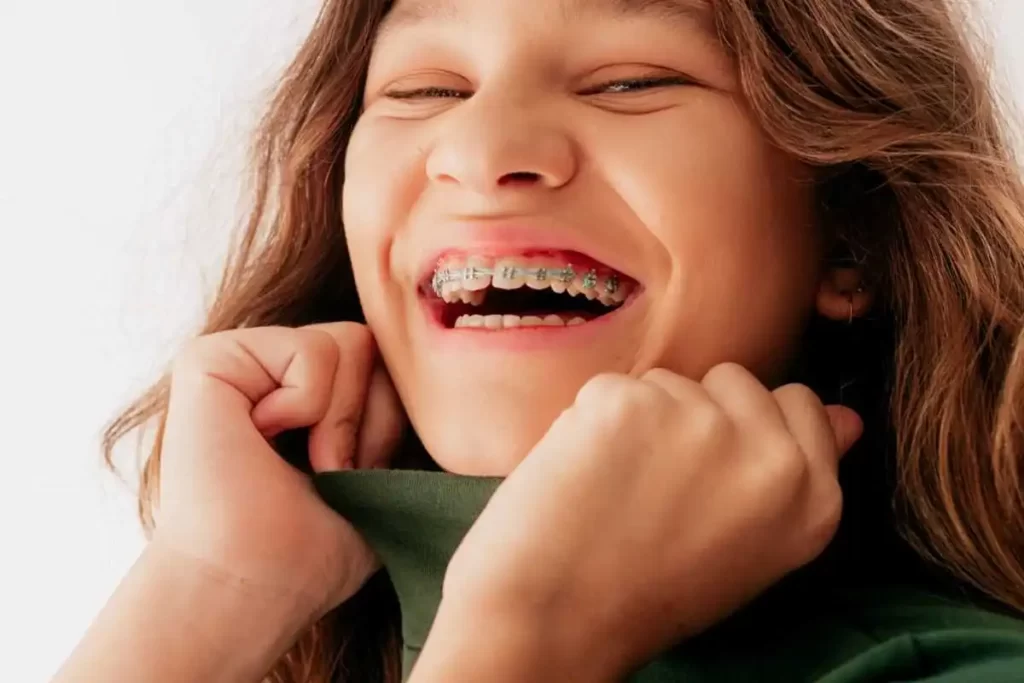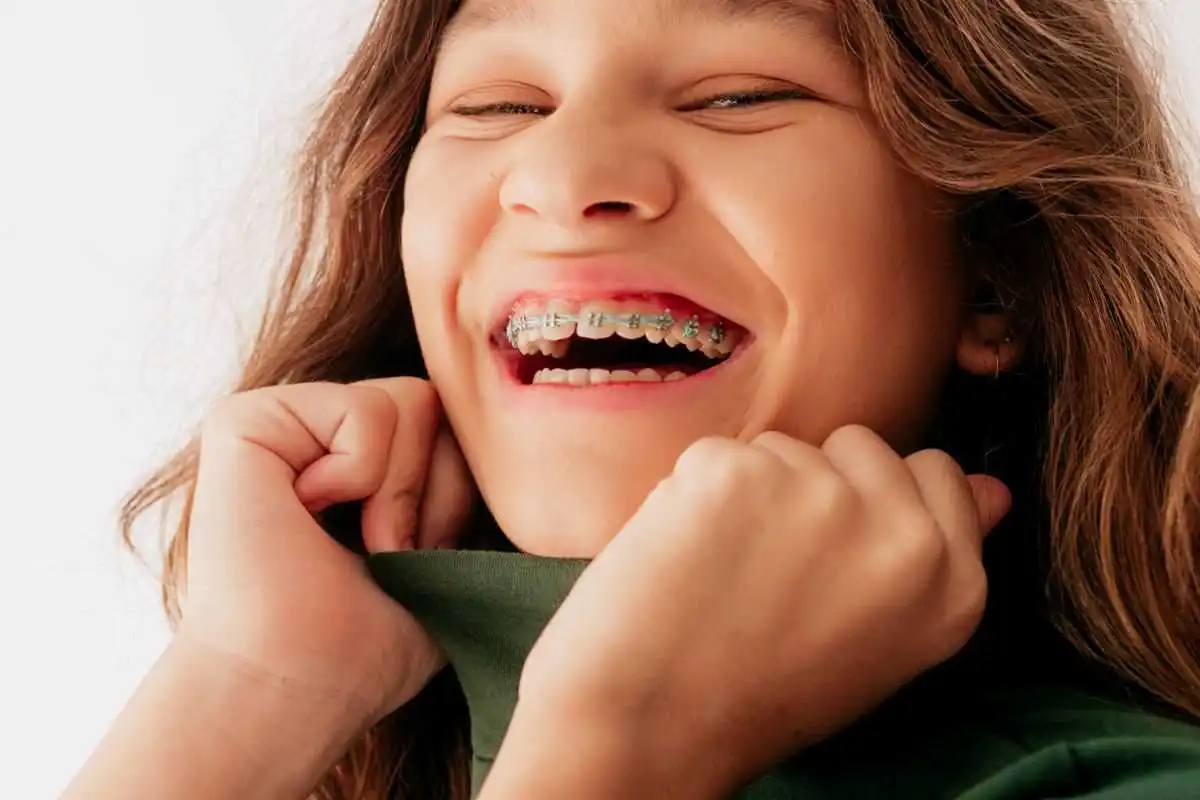Braces are a common orthodontic treatment that helps align teeth and improve oral health.
While the benefits of braces are well-known, some individuals may experience a phenomenon known as “teeth popping” during their orthodontic journey.
In this blog post, we will delve into the reasons behind teeth popping with braces, its implications, and effective solutions to address this concern.
Table of Contents
What is Teeth Popping with Braces?
Teeth popping with braces refers to the sensation or sound of a “pop” that individuals may experience while wearing orthodontic braces.
This phenomenon can be disconcerting for some, leading to concerns about the well-being of their teeth and the effectiveness of their orthodontic treatment.
To gain a better understanding, let’s explore the anatomy of braces and how they work.
The Mechanics of Braces

Braces consist of brackets, wires, and bands that work together to gradually move teeth into their desired positions.
The brackets are attached to the teeth, and the wires pass through them, applying gentle pressure to encourage tooth movement.
This process leads to the reshaping of the bone surrounding the teeth, allowing them to align properly over time.
The Role of Ligaments and Bone
Teeth are not directly attached to the braces; instead, they are connected to the braces through ligaments and bone.
These ligaments act as flexible connectors, allowing teeth to move in response to the pressure applied by the braces.
As the teeth shift, the ligaments and bone undergo a remodeling process, adapting to the new position of the teeth.
Read: Can Braces Make Your Teeth Fall Out? (7 Reasons).
The Experience of Teeth Popping
Individuals wearing braces may report experiencing a sensation of teeth popping, often accompanied by an audible sound.
This phenomenon can be unsettling, but it’s essential to recognize that, in most cases, it is a normal part of the orthodontic process.
Understanding the reasons behind teeth popping can help alleviate concerns and provide clarity to those undergoing orthodontic treatment.
Read: 10 Best Orthodontic Wax for Braces.
Reasons Why Your Teeth Are Popping with Braces
To address the concerns surrounding teeth popping with braces, it’s crucial to explore the various reasons behind this phenomenon.
Several factors contribute to the sensation of teeth popping, and understanding them can empower individuals to navigate their orthodontic journey with confidence.

1. Adjustment Period
One common reason for teeth popping with braces is the adjustment period. When braces are first placed or adjusted, the teeth experience increased pressure as they begin to shift into new positions.
This heightened pressure on the ligaments and bone can lead to the sensation of teeth popping.
The adjustment period is a crucial phase in orthodontic treatment where the initial discomfort and popping sensations are expected.
As the braces work to align the teeth, the ligaments undergo significant changes to accommodate the shifting positions.
It’s important to recognize that the adjustment period varies from person to person, and some individuals may experience more pronounced popping sensations than others.
During this phase, the ligaments surrounding the teeth undergo stretching and adaptation, causing the release of gases within the joints.
This release of gases, primarily nitrogen, is what contributes to the audible popping sound. It’s akin to the sound produced when you crack your knuckles or adjust other joints in your body.
It’s essential for individuals to be patient and understanding during the adjustment period.
The popping sensations are temporary, and as the ligaments and bone adapt to the new tooth positions, the discomfort typically diminishes.
Regular communication with your orthodontist is crucial during this time, as they can provide guidance on managing any discomfort and make adjustments to the treatment plan if necessary.
2. Ligament Stretching
Another contributing factor to teeth popping with braces is ligament stretching. As the braces exert pressure on the teeth, the ligaments connecting the teeth to the bone undergo a stretching process.
This stretching is a natural response to the orthodontic forces applied and is necessary for the teeth to move into their designated positions.
The ligaments play a crucial role in supporting the teeth, and their flexibility allows for controlled movement during orthodontic treatment.
The stretching of these ligaments can sometimes lead to the sensation of teeth popping, especially during moments of increased pressure, such as after a brace adjustment.
Understanding that ligament stretching is part of the orthodontic process can help individuals contextualize the popping sensations.
While the stretching may cause temporary discomfort, it is a sign that the braces are actively working to align the teeth properly.
3. Shifting Teeth
Teeth popping with braces may occur when the braces cause the teeth to shift slightly. This movement is intentional and part of the overall treatment plan designed by your orthodontist.
The braces apply consistent pressure on the teeth, prompting them to gradually shift into their desired positions.
During the shifting process, individuals may experience popping sensations as the teeth adjust to their new locations.
This is a positive sign that the braces are effectively moving the teeth, and over time, the popping sensations should diminish as the teeth settle into their corrected positions.
It’s important to note that the degree of tooth shifting varies among individuals based on factors such as the severity of misalignment, treatment plan specifics, and individual response to orthodontic forces.
4. Inconsistent Wire Movement
In some cases, teeth popping can be attributed to inconsistent wire movement. The orthodontic wire is a crucial component of braces, responsible for transmitting the pressure needed to move the teeth.
If the wire moves unevenly or experiences minor shifts, it can lead to localized popping sensations in specific areas of the mouth.
Orthodontists carefully plan and adjust the wires during appointments to ensure a controlled and gradual movement of the teeth.
However, occasional variations in wire movement may contribute to temporary popping sensations.
If individuals notice persistent or uncomfortable popping in specific areas, it’s advisable to communicate this to the orthodontic team for further evaluation and adjustments.
5. Jaw Movement
Natural jaw movement, such as chewing, speaking, or even yawning, can contribute to teeth popping with braces.
The combination of braces-induced pressure and the inherent mobility of the jaw joint may result in occasional popping sounds.
Jaw movement can be more noticeable during activities that involve substantial jaw engagement, like biting into hard foods.
While the braces are designed to withstand such forces, increased jaw movement during these activities can lead to temporary popping sensations.
It’s essential to be mindful of these activities, especially during the initial phases of brace placement or adjustments.
6. Retainer Adjustments
For individuals transitioning from braces to retainers, the use of retainers may introduce a new set of sensations, including teeth popping.
Retainers are custom-made appliances designed to maintain the corrected positions of the teeth after braces are removed.
The adjustment to retainers can cause temporary popping sensations as the oral structures adapt to the new appliance.
This is particularly common during the initial days of retainer use. As the teeth stabilize within the retainer, the popping sensations should decrease.
Understanding the reasons behind teeth popping with braces allows individuals to approach their orthodontic journey with informed expectations. While the sensations may be surprising, they are typically a sign that the braces are actively working to achieve the desired results.
Managing Teeth Popping Sensations
Now that we have explored the various reasons behind teeth popping with braces, it’s essential to address how individuals can manage these sensations for a more comfortable orthodontic experience.
While popping sensations are often a normal part of the adjustment process, there are practical strategies to minimize discomfort and promote overall well-being during orthodontic treatment.
Communication with Orthodontist
Open and proactive communication with your orthodontist is paramount throughout your orthodontic journey.
If you are experiencing persistent discomfort or have concerns about the popping sensations, don’t hesitate to discuss these issues with your orthodontic specialist.
They have the expertise to assess your individual situation, make necessary adjustments to your treatment plan, and provide guidance on managing any related discomfort.
Your orthodontist may recommend specific measures based on the severity and nature of the popping sensations.
Regular check-ups and follow-up appointments allow them to monitor your progress and address any emerging issues promptly.
Pain Management
Over-the-counter pain relievers, such as acetaminophen or ibuprofen, can be effective in managing discomfort associated with teeth popping.
However, it’s crucial to follow the recommended dosage and consult with your orthodontist before using any medications.
They can provide personalized advice based on your specific needs and ensure that the chosen pain relief method aligns with your overall orthodontic treatment plan.
Orthodontic Wax
Orthodontic wax is a helpful tool in managing irritation or discomfort caused by braces.
If certain brackets or wires are contributing to the popping sensations, applying a small amount of orthodontic wax can create a protective barrier.
This helps reduce friction between the braces and the inner cheeks, minimizing the likelihood of discomfort and potential exacerbation of popping sensations.
Orthodontic wax is widely available and easy to use. Your orthodontist can provide guidance on its proper application and removal.
It’s important to use orthodontic wax as directed to ensure optimal comfort without compromising the effectiveness of your braces.
Read: Orthodontic Wax for Braces: How to Use, Where to Buy & More.
Soft Diet
During the initial days following brace adjustments, sticking to a softer diet can alleviate stress on the teeth and reduce the likelihood of popping sensations.
Opt for foods that are easy to chew and require less biting force. This can include items like mashed potatoes, yogurt, smoothies, and soup.
A soft diet is a temporary measure to make the adjustment period more comfortable. As your teeth adapt to the changes brought about by the braces, you can gradually reintroduce a regular diet.
It’s advisable to follow any dietary recommendations provided by your orthodontist to support the orthodontic process.
Jaw Exercises
Gentle jaw exercises recommended by your orthodontist can help alleviate tension and promote smoother movements.
These exercises are designed to enhance jaw flexibility and reduce the likelihood of excessive popping sensations.
Incorporating jaw exercises into your routine, as advised by your orthodontic specialist, can contribute to a more comfortable orthodontic experience.
The specific exercises will vary based on individual needs and treatment plans. Your orthodontist will provide clear instructions on how to perform these exercises effectively and safely.
When to Be Concerned
While teeth popping with braces is often a normal part of the orthodontic process, there are situations where individuals should seek professional advice.
Recognizing when to be concerned and promptly addressing any issues can contribute to the overall success of your orthodontic treatment.
1. Persistent Pain
If the popping sensations are accompanied by persistent pain or discomfort that does not improve with time or pain management strategies, it’s crucial to consult with your orthodontist.
Persistent pain may indicate an underlying issue that requires attention, such as misaligned braces, damaged wires, or other orthodontic complications.
2. Swelling or Inflammation
Swelling or inflammation in the oral tissues, particularly around the braces, should be addressed promptly.
These symptoms may suggest an irritation or allergic reaction to certain components of the braces.
Seeking professional advice ensures that the cause of the swelling is identified and appropriate measures are taken to alleviate the discomfort.
3. Disruption in Treatment
If a brace or wire appears damaged or broken, seeking immediate attention is essential to prevent disruptions in the treatment plan.
Broken braces or wires can impede progress and potentially lead to prolonged treatment times.
Individuals should contact their orthodontic specialist as soon as possible if they notice any issues with their braces.
4. Concerns About Bite Alignment
If you experience significant changes in your bite alignment or notice that your teeth are not coming together as they should, it’s important to bring this to the attention of your orthodontist.
Changes in bite alignment may indicate issues with the effectiveness of the braces or the need for additional adjustments.
5. Any Unusual Symptoms
Unusual symptoms, such as persistent headaches, jaw pain, or difficulty in speaking or chewing, should not be ignored.
These symptoms may be unrelated to the typical orthodontic discomfort and could indicate an underlying issue that requires professional evaluation.
Occasional popping sensations are often a normal part of the orthodontic journey, but being attentive to any persistent or concerning symptoms ensures a smooth and successful treatment process. Regular communication with your orthodontist, timely intervention when needed, and adherence to recommended care strategies contribute to a positive orthodontic experience.
Conclusion
Teeth popping with braces, though initially disconcerting, is a common and typically harmless aspect of the orthodontic process.
Understanding the reasons behind this phenomenon, recognizing the normalcy of certain sensations, and actively managing discomfort empower individuals to navigate their orthodontic journey with confidence.
As you progress through the adjustment period, it’s essential to stay in close communication with your orthodontic specialist. They are your partners in achieving a straighter, healthier smile.
Remember that each individual’s orthodontic journey is unique, and the popping sensations you experience are often signs of progress toward a beautifully aligned smile.
By following the strategies outlined in this blog post and maintaining a proactive approach to your orthodontic care, you can enhance your overall comfort and contribute to the success of your treatment.
Embrace the transformative journey toward a confident and radiant smile, knowing that the occasional popping is a testament to the positive changes happening within your oral structures.
If you ever have questions or concerns about your orthodontic treatment, don’t hesitate to reach out to your orthodontist.
Their expertise and guidance are invaluable resources on your path to achieving the smile you’ve always wanted. Cheers to a healthy, happy, and beautifully aligned set of teeth!

